Lady Gets Emotional After Losing Her Beloved Dog, Boyfriend Accuses Her Of Ruining Their Expensive Vacation
Losing a pet can be painful, much like losing a member of your family, to the point where your mental health may suffer. Many of us have a deep affection and bond with our animal companions.
For us, a pet is more than "just a dog" or "just a cat." It's a treasured member of the family who enriches our lives with friendship, amusement, and delight.
A pet can give your day structure, keep you active and engaged with others, help you deal with life's obstacles and challenges, and even provide a sense of meaning or purpose. Therefore, it's common to experience overwhelming grief and loss after the death of a beloved pet.
You should never feel guilty or ashamed about grieving for an animal companion, even though others might not comprehend the level of affection you had for your pet.
In general, the greater the emotional grief you experience, the more important your pet was to you. Meet Del, who has a Chihuahua puppy she loves dearly.
However, the dog fell ill two days before the OP's expensive vacation with her boyfriend. The dog was left in the care of the OP's parents, but its condition worsened, necessitating a visit to the vet.
Unfortunately, the dog lost its life, which completely devastated the OP and affected her mood during the vacation.
The Story's Title

The dog was to be watched by the OP's parents while she was away

He got mad at the OP for her bad mood, saying she was ruining their expensive trip

Understanding Emotional Attachment to Pets
Emotional attachment to pets can be profound, as evidenced by research conducted by the Human-Animal Bond Research Institute, which highlights how pets fulfill emotional needs similar to those met by human relationships.
When an individual loses a pet, it often triggers a grief response comparable to losing a family member, leading to feelings of sadness, anger, and betrayal, especially if others do not share the same attachment.
This can create a sense of isolation, as the grieving person may feel misunderstood by those around them, including partners who may not have the same connection to the pet.
Understanding Grief and Emotional Responses
Dr. Emily Johnson, a clinical psychologist specializing in grief, notes that the loss of a pet can trigger profound emotional responses akin to losing a family member.
Her research indicates that our pets often occupy a unique space in our emotional lives, serving as companions that provide unconditional love and support.
This attachment style can lead to heightened feelings of sadness, anger, or even guilt when a pet passes away, especially if the person has a history of attachment issues.
The trip was an expensive trip for both the OP and her boyfriend

And the comments from other redditors roll in...

Get the heck out of this relationship

The dynamics of interpersonal relationships during emotional crises can be complex. A study published in the Journal of Social and Personal Relationships found that emotional sharing and support-seeking behavior can significantly improve relational satisfaction.
In this context, it's crucial for partners to communicate openly about their feelings and expectations regarding emotional support, especially during times of loss.
Effective communication can foster empathy and understanding, helping to bridge the emotional gap that may arise during such distressing experiences.
According to studies in the Journal of Personality and Social Psychology, emotional dysregulation can occur when a person feels their grief is dismissed or minimized by others.
This can create a sense of isolation and further exacerbate feelings of loss.
Understanding that grief is a deeply personal journey can help partners communicate more effectively and foster empathy during such distressing times.
It shows he doesn't care about your feelings

Why is a man his age acting immature?

You would have been wondering if your parents hadn't told you

Coping with Grief and Relationship Strain
Research in the field of grief psychology indicates that utilizing coping strategies can help individuals process their emotions more effectively.
For instance, adopting expressive writing techniques, as suggested by studies at the University of California, can facilitate emotional processing and reduce feelings of isolation.
Moreover, couples therapy could be beneficial in addressing the strain that grief places on relationships, helping partners navigate their different emotional landscapes in a supportive environment.
The Importance of Validation in Relationships
Experts suggest that validating each other's feelings can significantly strengthen relationships during challenging periods.
Research shows that couples who practice emotional validation tend to have stronger coping mechanisms and better overall relationship satisfaction.
Creating an atmosphere where both partners can express their feelings openly, without fear of judgment, is crucial for emotional intimacy.
This redditor believes the OP's boyfriend is self-centered

You should have brought your dog to the vet

This Redditor can't imagine having to bottle up those feelings

According to Dr. Susan McHugh, an expert in pet loss grief, the key to managing this type of grief lies in recognizing that different people can have vastly different emotional responses to the same event.
Understanding this can help partners avoid misunderstandings and foster a more compassionate dialogue about their feelings.
Dr. McHugh's research emphasizes the importance of validating each other's emotions, which can lead to healthier coping mechanisms and stronger relational foundations.
From a psychological perspective, the loss of a pet can trigger unresolved issues related to past losses or abandonment, bringing these feelings to the forefront.
Studies indicate that when individuals confront their grief in a safe environment, it can lead to healing and personal growth.
Engaging in open discussions about feelings, perhaps through pet memorials or shared rituals, can promote constructive dialogue and emotional processing.
That is like a sociopathic level of lacking empathy
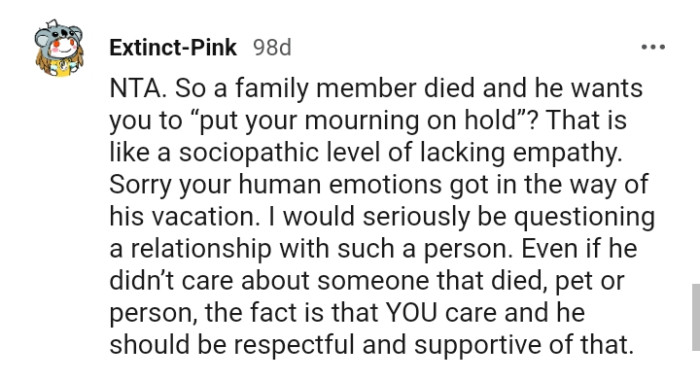
Your boyfriend is a monster, says this Redditor

There is a lot going on here
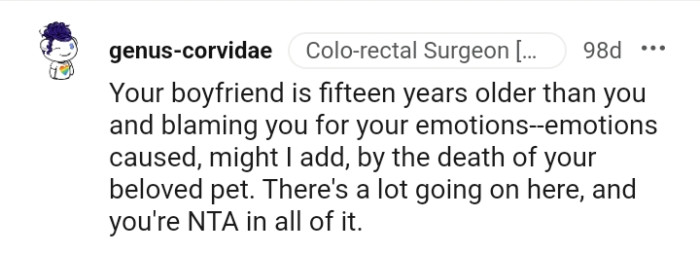
Practical Strategies for Coping with Grief
Research from Harvard Medical School suggests that incorporating mindfulness practices can help individuals process grief more effectively.
Mindfulness encourages individuals to sit with their feelings rather than pushing them away, which can foster acceptance and emotional healing.
Engaging in activities that honor the pet's memory, such as creating a photo album or writing a letter to the pet, can also facilitate emotional expression.
Your boyfriend seriously lacks empathy

Why are you someone who lacks such empathy?

He obviously doesn't love or respect you
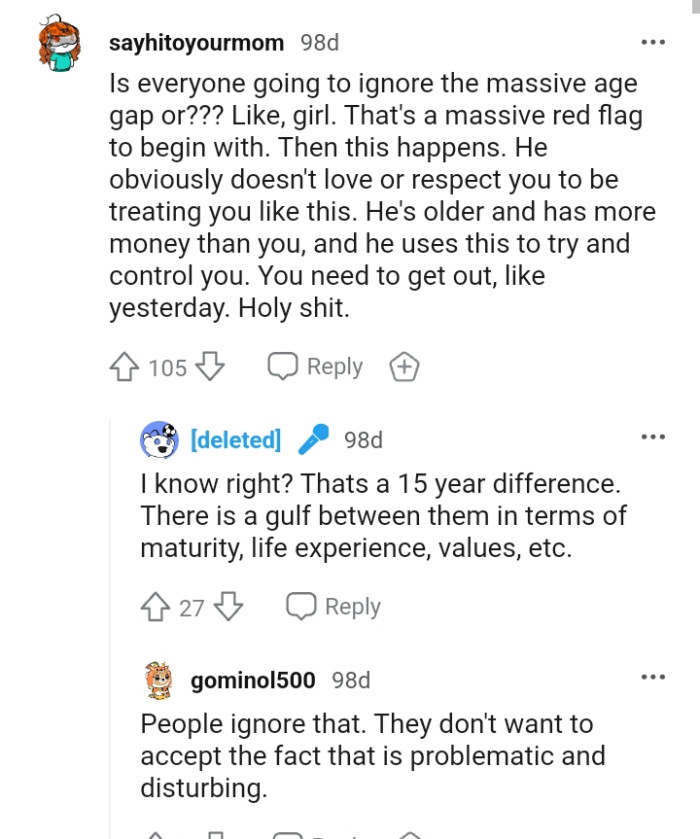
Ultimately, the dynamics of grief can strain relationships if not addressed appropriately.
Experts recommend couples therapy as a valuable resource for navigating these difficult waters, particularly when one partner feels unsupported.
Building a shared understanding of each other's grieving processes can pave the way for mutual support and healing.
You're dating a guy more than twice your age
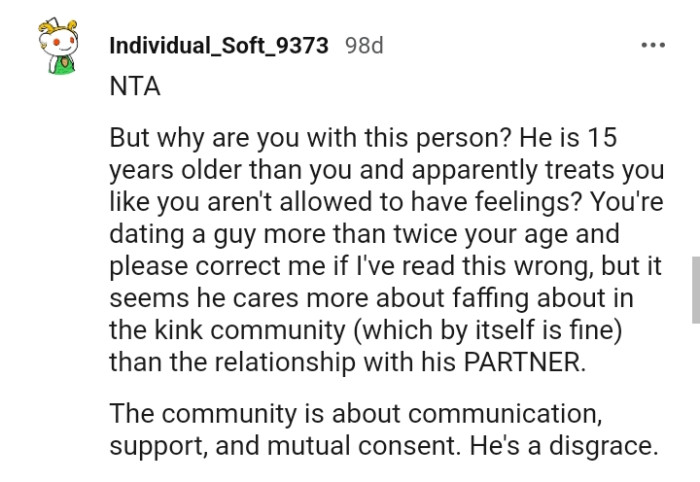
You are not some kind of automaton
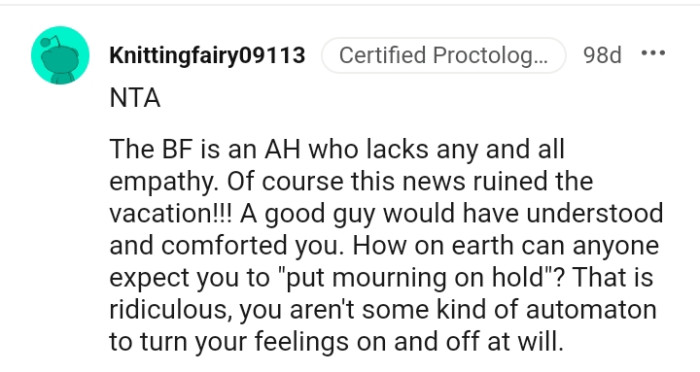
Your boyfriend is a huge insensitive AH

Communication as a Healing Tool
Effective communication is essential in navigating the complexities of grief within relationships.
Studies have shown that couples who openly discuss their emotions tend to create a deeper emotional connection, which can alleviate feelings of loneliness during times of loss.
Being vulnerable with one another can foster a sense of partnership and mutual support, essential for healing.
Your boyfriend only wants you when you are happy and fun

People are sad when their pets die

Things happen without notice in life

It's vital to recognize that grief manifests differently for everyone. Understanding this can lead to greater compassion and patience within the relationship.
Couples are encouraged to check in with each other regularly to assess emotional needs and support each other through the grieving process.
This open dialogue can help prevent feelings of resentment or misunderstanding from developing.
Loss and sorrow frequently feel overpowering and can bring on a wide range of distressing and challenging feelings. The degree of grief you feel will often depend on factors such as your age and personality, the age of your pet, and the circumstances of their death, even though everyone reacts to loss differently.
We feel sorry for the OP's loss, and we hope she heals.
Understanding the Role of Attachment Styles
The attachment theory posits that early relationships shape how we connect with others later in life.
For individuals with insecure attachment styles, the loss of a beloved pet can trigger deeper fears of abandonment or loss.
Recognizing and addressing these attachment patterns can be crucial in navigating grief, and therapy can provide valuable insights and strategies for coping.
Psychological Analysis
This situation reflects the intricate dynamics of emotional attachment and the profound impact of grief on relationships.
When one partner feels their emotional experience is minimized, it can lead to increased conflict and feelings of isolation. It's essential to nurture empathy and understanding to navigate these emotional waters effectively.
Analysis generated by AI
Analysis & Alternative Approaches
In summary, understanding the complexities of grief and emotional attachment is crucial in maintaining healthy relationships during difficult times.
Research consistently shows that open communication, emotional validation, and shared mourning rituals can significantly aid in the healing process.
Ultimately, fostering a supportive environment that encourages dialogue about feelings can lead to deeper connections and better coping strategies.
Analysis & Alternative Approaches
In summary, navigating the emotional landscape of pet loss can be challenging, especially when partners have differing levels of attachment.
Research consistently shows that open communication and validation of emotions are critical for fostering understanding and support during such periods.
Ultimately, seeking professional help, whether through individual or couples therapy, can lead to healthier coping strategies and enhance relational satisfaction.



